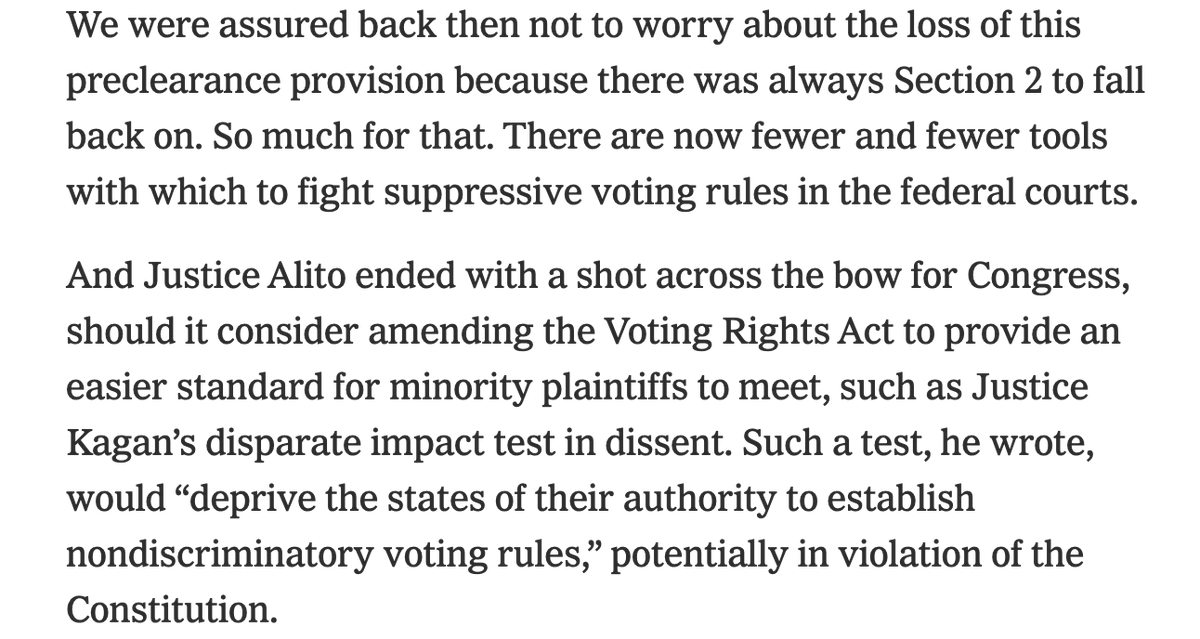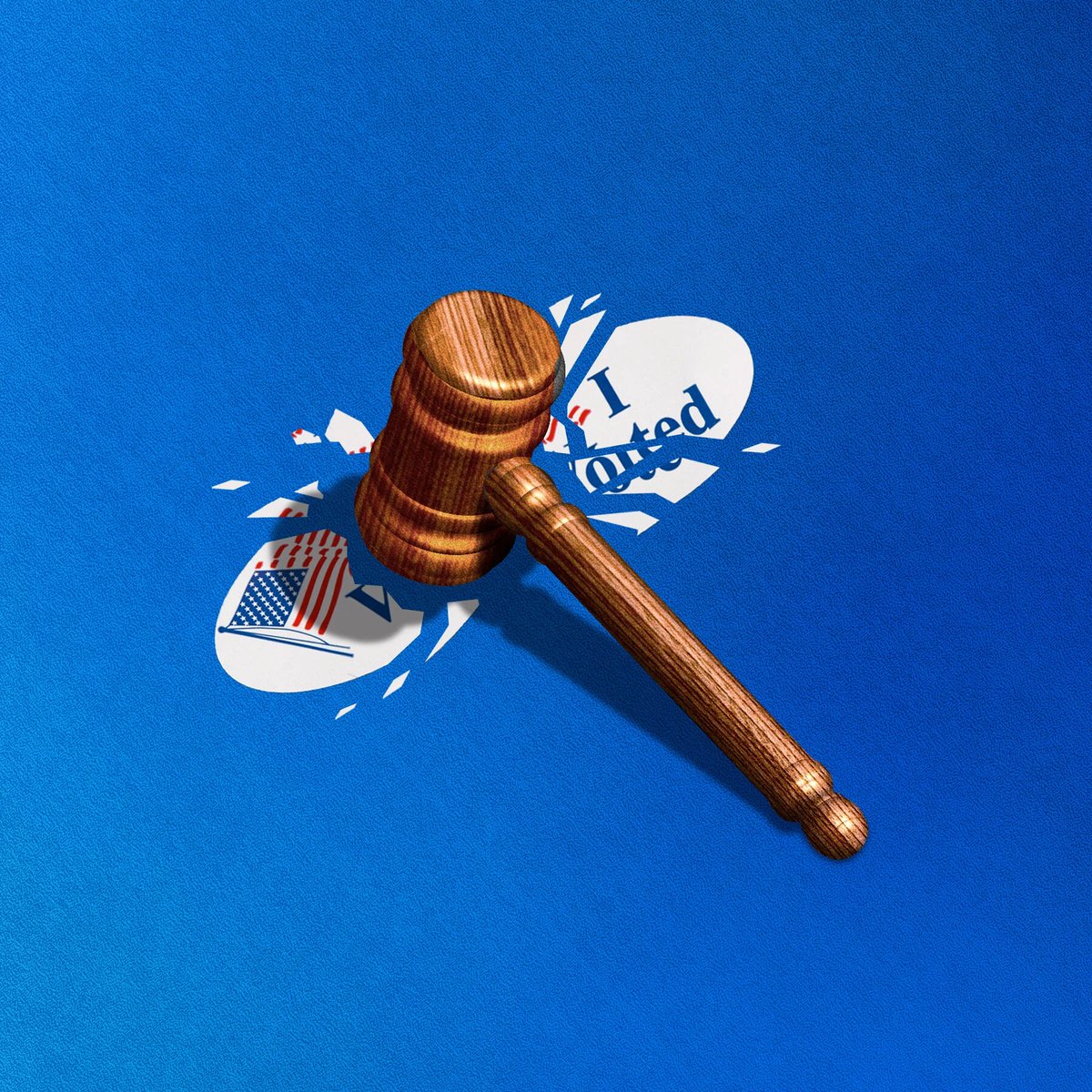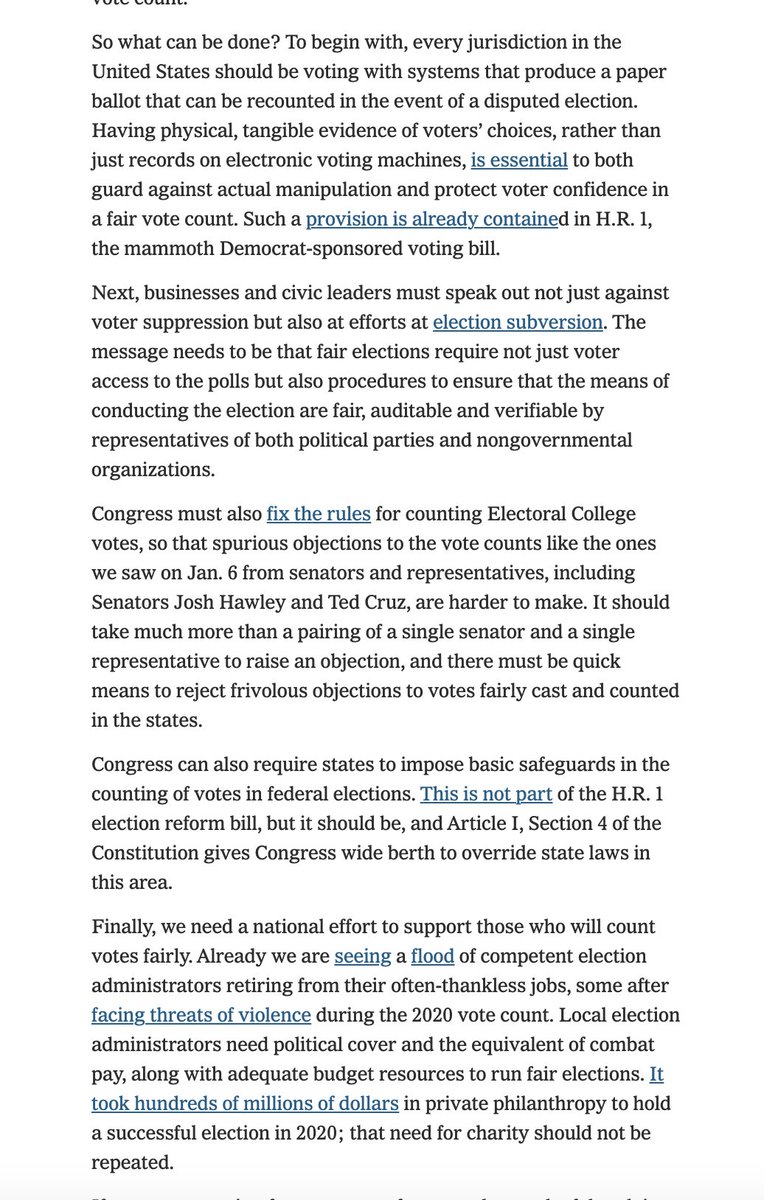
Tomorrow morning (at 7 am PT) the Supreme Court is expected to issue opinions in its two remaining cases: Brnovich on voting rights and AFP v. Bonta on donor disclosure.
Here's what at stake and what I'll be looking for:
/1
Here's what at stake and what I'll be looking for:
/1
In Brnovich, the Democratic National Committee and others sued over two Arizona voting rules: one that doesn't count votes cast by a voter in the wrong precinct and one that prevents third party collection of absentee ballots (so-called "ballot harvesting"). /2
Democrats in Brnovich claim these rules violate Section 2 of the Voting Rights Act, which provides that minority voters must have the same opportunity as other voters to participate in the political process and to elect representatives of their choice. /3
The Supreme Court has interpreted Section 2 many times in the context of redistricting (beginning in the 1986 case of Thornburg v. Gingles). But it has never weighed in on how Section 2 applies to so-called "vote denial" cases involving laws making it harder to register or vote.
Lower courts have done a pretty good job in Section 2 vote denial cases. The en banc 5th Circuit, among the most conservative in the country, held that Texas' very strict voter id law violated section 2; it later held that a less strict version was ok under the law. /6
Republicans argue in Brnovich before the Supreme Court that Section 2 should be read as essentially a dead letter when it comes to vote denial case. Democrats put forward a test that would turn almost any racial disparity in voting rules as violative of Section 2. /7
This leaves minority voters stuck in the middle. Democrats brought a suit here that many voting rights lawyers wish they wouldn't have, because Arizona's restrictions are relatively tame but found violative of section 2 by the very liberal 9th Circuit. /8
That just creates a huge target for conservatives to use this relatively weak case in Brnovich to substantially weaken section 2 in the vote denial context. I explained this in February @scotusblog. /9 scotusblog.com/2021/02/a-part…
At oral argument in Brnovich, it was clear that Democrats were going to lose, but some conservatives, like Justice Barrett seemed uncomfortable with the extreme arguments made by Republicans that would render section 2 a dead letter in vote denial cases. /10
So the best-case scenario I see in Brnovich is a split court, where the liberals line up with at least 2 of Roberts-Barrett-Kavanaugh to preserve some of Section 2 to challenge vote denial laws like the Texas voter id law. See my #ELB post: electionlawblog.org/?p=122703 /11
In that #ELB post, I explained that Justice Stevens was able to craft a kind of compromise in 2008 Crawford case over Indiana's voter id law (a constitutional case). He lined up with Roberts and Kennedy for a middle position, which prevailed over the extreme Scalia position. /12
I hope we can see a similar thing this time in Brnovich, but we may not. It could be very bad, with some Justices perhaps suggesting Section 2 is itself unconstitutional. /13
There's a separate issue in Brnovich, because 9th Circuit also found that AZ enacted its ballot collection law with racially discriminatory intent. The Court will almost certainly reverse that holding, given Justice Alito's earlier awful opinion in Abbott v. Perez. /14
I explained in this @GeorgetownLJ piece how Justice Alito's opinion in Abbott v. Perez makes it virtually impossible to find racially discriminatory intent in voting rules when race and party categories overlap. /15
law.georgetown.edu/georgetown-law…
law.georgetown.edu/georgetown-law…
So if Justice Alito has a MAJORITY opinion tomorrow in Brnovich and the liberals dissent, that will be a sign of something very, very bad. /16
Now onto AFP v. Bonta, the other case the Supreme Court is expected to decide tomorrow. It involves disclosure of donor information to government officials, but it could have major bad implications for campaign finance disclosure laws. /17
California, like the IRS on the federal level, requires certain nonprofits to provide lists of donors above a certain threshold to the government. These are records that are NOT publicly disclosed (unlike FEC records of campaign contributions). /18
Americans for Prosperity and other ideological nonprofits that play in politics argue that they have the right to keep their donors anonymous, citing First Amendment cases such as those involving harassment of donors to the NAACP during the period of segregation. /19
California defends its law as necessary to ferret out fraud. The district court was skeptical of that (although the district court judge was notoriously terrible). But there was also evidence that CA did an awful job protecting the private info nonprofits gave the state. /20
The Ninth Circuit upheld the law, and once again the much more conservative Supreme Court is likely to disagree and hold that AFP's rights were violated. The question again will not be IF CA loses but how. /21
It is possible there will be a very narrow, fact specific ruling that says that on this record CA did not demonstrate it could protect privacy or needed to prevent fraud. If CJ Roberts has the opinion, he often likes to go narrow. /22
But the ruling could be much broader, and it could have big implications for campaign finance disclosure. Both the law at issue in AFP and campaign disclosure cases require the government's law to be tested under a middle "exacting scrutiny" standard. /23
CJ Roberts or another Justice could write a seemingly narrow opinion in AFP that makes the government meeting the "exacting scrutiny" significantly harder and call into question lots of campaign finance laws. More on that here: electionlawblog.org/?p=122908 /24
One key issue lurking is the background of AFP is the extent to which there should be stronger protection of anonymity given a risk of harassment in our polarized society. My view is that claims of harassment have been vastly overstated: privpapers.ssrn.com/sol3/papers.cf… /24
But Thomas, Alito, and likely Gorsuch and other conservative Justices see conservatives as under attack, and they are likely to support a ruling that makes disclosure much harder. The question is if they get to 5 Justices for this position in AFP. /25
A broad ruling in AFP against disclosure could have terrible ramifications, as disclosure deters corruption, gives voters valuable cues as to how to vote, and supports enforcement of other laws, like the ban on foreign money. /26
So I'll be watching it all very early Thursday morning, with some tv/radio stuff lined up, along with some opeds and commentary at #ELB electionlawblog.org. It could be a blockbuster day, but I'm hoping it is not for the sake of our democracy. /27
And if you want to make sense of the bigger picture at #SCOTUS, please attend our free (but registration required) 11th annual SCOTUS term in review event @ucilaw, sponsored by @torklaw lawworks. We've got an all-star panel! /28 calendar.law.uci.edu/event/11th_ann…
Speaking at our July 6 @ucilaw #SCOTUS term in review event: @emilybazelon, Erwin Chemerinsky, @ProfStephenLee @ProfMMurray and Paul Clement. As always, I'm moderating. Tweet your questions using the hashtag #ucilawscotus
What a cast of all-stars! /29 calendar.law.uci.edu/event/11th_ann…
What a cast of all-stars! /29 calendar.law.uci.edu/event/11th_ann…
Current mood: 😬
Brnovich---Justice Alito writes for the 6-3 Court in upholding Arizona's rules against a Voting Rights Act section 2 challenge. supremecourt.gov/opinions/20pdf…
What does it mean?
What does it mean?
AFP---Chief Justice Roberts, 6-3 vote, striking down California requirement on donor disclosure
supremecourt.gov/opinions/20pdf…
supremecourt.gov/opinions/20pdf…
The Supreme Court, in a 6-3 decision, has severely weakened Section 2 of the Voting rights Act as a tool to fight against laws that make it harder to register and vote.
Read my analysis at electionlawblog.org #ELB electionlawblog.org/?p=123065
Next to AFP
Read my analysis at electionlawblog.org #ELB electionlawblog.org/?p=123065
Next to AFP
Breaking and Analysis: Supreme Court on 6-3 Vote in AFP Case Severely Undermines Case for Constitutionality of Campaign Finance Disclosure Laws
Read my analysis at electionlawblog.org #ELB electionlawblog.org/?p=123070
In depth analysis of Brnovich, AFP coming from me later today.
Read my analysis at electionlawblog.org #ELB electionlawblog.org/?p=123070
In depth analysis of Brnovich, AFP coming from me later today.
My new @nytimes on the rulings today in Brnovich and AFP: "It is too much to ask for the Supreme Court to be the main protector of American democracy. But it should not be too much to ask that the court not be one of the major impediments."nytimes.com/2021/07/01/opi…
and don't be so quick to think that this conservative Supreme Court will allow Congress, even if there were the will, to rewrite the Voting Rights Act to get around the bad decision in Brnovich and impose a "disparate impact" test: 

And the key point on AFP: Campaign disclosure and even campaign contribution limits could soon be on the chopping block 

and they've retitled it: "The Supreme Court Abandons Voting Rights"
nytimes.com/2021/07/01/opi…
nytimes.com/2021/07/01/opi…
• • •
Missing some Tweet in this thread? You can try to
force a refresh








